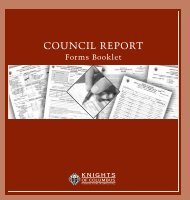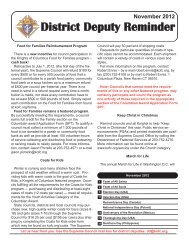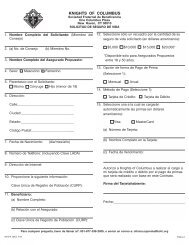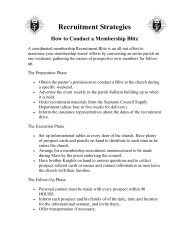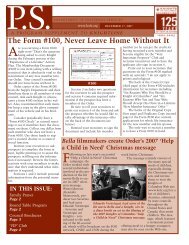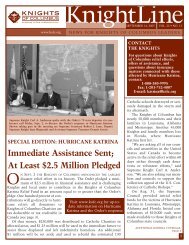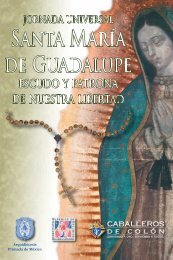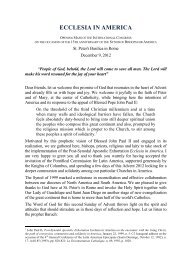Financial Secretary Handbook - Knights of Columbus, Supreme ...
Financial Secretary Handbook - Knights of Columbus, Supreme ...
Financial Secretary Handbook - Knights of Columbus, Supreme ...
You also want an ePaper? Increase the reach of your titles
YUMPU automatically turns print PDFs into web optimized ePapers that Google loves.
available to the new council/assembly. No member<br />
billing information is viewable.<br />
I would like to be able to look at the pending<br />
assessments/dues bills before printing them to<br />
confirm that they are correct. How do I proceed?<br />
The application will not give you the opportunity to<br />
view each individual member bill prior to processing<br />
the Pending Assessments.<br />
To assure that the assessments will process correctly,<br />
after you have generated the assessment (Clicking on<br />
the Assess Dues button in the council/assembly dues<br />
process or the Assess Other button in the special/miscellaneous<br />
process) you should review the amounts on<br />
the Pending Assessments screen (Council<br />
Ledger/Assessments/Pending Assessments or Assembly<br />
Ledger/Assessments/Pending Assessments). If the total<br />
properly reflects the amount to be billed (and adjusted),<br />
click on the Process Assessments button. If for some<br />
reason a member’s bill is wrong, an adjustment can be<br />
made on the Member Ledger.<br />
I inadvertently assessed dues for the current<br />
year, not the new year. How do I back it out?<br />
An assessment can be deleted, if there are no receipt<br />
transactions associated with it. Under the Assessment<br />
section <strong>of</strong> the Council/Assembly ledger, click on<br />
Assessment History. After searching for the assessment,<br />
click on the Assessment Type reference, which is<br />
a link to the Assessment Details screen. On the lower<br />
right-hand side <strong>of</strong> this screen, click the Delete checkbox<br />
and Delete button.<br />
I posted a special assessment as mandatory. Is<br />
there a way <strong>of</strong> changing it to voluntary?<br />
Yes. You will need to delete the assessment and then<br />
re-enter it on the Assess Other screen as a voluntary<br />
assessment.<br />
How do I print membership cards for one or a<br />
few members?<br />
There are two options in printing cards for a single<br />
member. First, in the Member Billing Print Center,<br />
under Membership Cards there is the Membership<br />
Card Template option, which will allow you to enter<br />
the member’s information. The second option is to set<br />
the Billing Status (on the top <strong>of</strong> the Member Ledger<br />
page) to Dues are Current and set the as <strong>of</strong> date to an<br />
arbitrary value (such as 12-02-2008). When you print<br />
membership cards, select the tab that says All<br />
Members Whose Dues are Current (instead <strong>of</strong> the<br />
default By Member Type). Set the from and to dates as<br />
12-02-2008 (your arbitrary date) and click on the Print<br />
Cards button. Be sure to re-set the Billing Status and as<br />
<strong>of</strong> values when completed.<br />
LEGAL STATUS OF COUNCILS IN THE<br />
UNITED STATES<br />
What is the <strong>Knights</strong> <strong>of</strong> <strong>Columbus</strong>?<br />
The <strong>Knights</strong> <strong>of</strong> <strong>Columbus</strong> is a specially-chartered<br />
Connecticut corporation that has no parent companies,<br />
no stock, and no subsidiaries. The <strong>Knights</strong> <strong>of</strong><br />
<strong>Columbus</strong> is the world’s largest Catholic fraternal service<br />
organization. Currently, there are more than 1.8<br />
million members in the United States, Canada, Mexico,<br />
the Philippines, Puerto Rico, Cuba, the Dominican<br />
Republic, Guam, Poland, Panama, the Virgin Islands,<br />
the Bahamas, Guatemala, and Saipan. Founded in 1882,<br />
the <strong>Knights</strong> <strong>of</strong> <strong>Columbus</strong> operates through and maintains<br />
an active system <strong>of</strong> local and state councils<br />
through which extensive charitable and volunteer programs<br />
are conducted.<br />
Is the <strong>Knights</strong> <strong>of</strong> <strong>Columbus</strong> a charity recognized<br />
by the Internal Revenue Service (“IRS”)<br />
under Section 501(c)(3) <strong>of</strong> the Internal Revenue<br />
Code (“IRC”)?<br />
No. The <strong>Knights</strong> <strong>of</strong> <strong>Columbus</strong> is a fraternal benefit<br />
society recognized under IRC Section 501(c)(8).<br />
Are all <strong>Knights</strong> <strong>of</strong> <strong>Columbus</strong> councils and<br />
assemblies in the United States eligible to be recognized<br />
under Section 501(c)(8)?<br />
Yes. As a unified corporate entity, the <strong>Knights</strong> <strong>of</strong><br />
<strong>Columbus</strong> encompasses not only the <strong>Supreme</strong> Council,<br />
but all subordinate units (i.e., state councils, local<br />
councils, chapters, and assemblies). Accordingly, all<br />
subordinate units in the United States may be recognized<br />
by the IRS as “fraternal lodges” under Section<br />
501(c)(8). In order to be recognized under Section<br />
501(c)(8), each council, chapter, or assembly must provide<br />
its Employer Identification Number (EIN) to the<br />
Home Office Legal Department, which in turn will<br />
report the EIN to the IRS for inclusion in the Order’s<br />
group exemption listing.<br />
Are all <strong>Knights</strong> <strong>of</strong> <strong>Columbus</strong> councils and<br />
assemblies in the United States exempt from federal<br />
taxation?<br />
The <strong>Knights</strong> <strong>of</strong> <strong>Columbus</strong> <strong>Supreme</strong> Council and its<br />
subordinate units in the United States are generally<br />
exempt from paying federal income tax on ordinary<br />
receipts (e.g., funds received for charitable or fraternal<br />
purposes). However, unrelated business income would<br />
be subject to federal income taxation. See IRS instructions<br />
for Form 990 or Form 990-EZ.<br />
— 93 —



